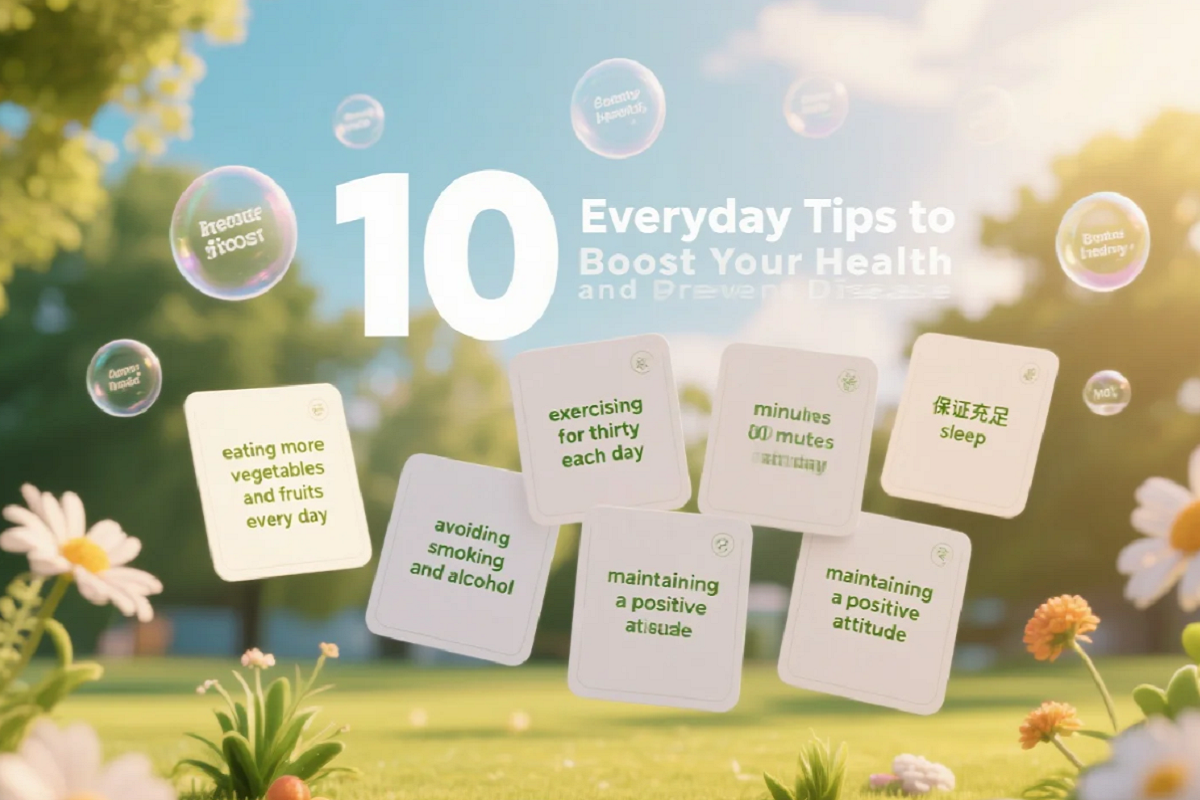10 Everyday Tips to Boost Your Health and Prevent Disease
-
22
- 25 Oct, 2025

In today’s fast-paced world, prioritizing your health can often take a backseat to busy schedules, work, and personal commitments. However, adopting simple, daily habits can significantly improve your well-being and even prevent future diseases. The key lies in small, sustainable changes that support long-term health and prevent serious health issues like heart disease, diabetes, and more.
In this article, we will cover 10 practical and science-backed health tips that you can easily incorporate into your daily routine. These tips will help boost your immune system, enhance energy levels, and ultimately lead to a healthier, happier life.
1. Kickstart Your Morning with a Nutritious Breakfast
A healthy breakfast is one of the most important things you can do to set a positive tone for the day. Eating a balanced meal in the morning not only provides energy but also helps to stabilize blood sugar levels, which can prevent midday crashes and cravings.
Key Elements of a Healthy Breakfast:
- Whole grains: Oats, whole-grain bread, or quinoa.
- Protein: Eggs, Greek yogurt, or plant-based alternatives like tofu or nut butter.
- Healthy fats: Avocados, nuts, or seeds.
- Fiber: Fruits and vegetables like berries, spinach, or bananas.
By fueling your body with nutrient-dense foods, you’re giving it the best start possible for mental clarity and sustained energy throughout the day.
2. Stay Hydrated Throughout the Day
Staying hydrated by drinking water throughout the day is crucial for maintaining optimal health. Hydration supports digestion, improves skin health, boosts cognitive function, and helps maintain a healthy body temperature.
While the standard recommendation is 8 cups (64 ounces) of water per day, individual hydration needs can vary. The goal is to drink enough to stay hydrated and avoid dehydration symptoms, such as headaches, dizziness, and fatigue.
Tips to Stay Hydrated:
- Keep a reusable water bottle with you at all times to stay refreshed and hydrated.
- Incorporate water-packed foods such as cucumbers, watermelon, and oranges into your diet.
- Add flavor to your water with natural infusions like lemon, mint, or cucumber.
- Drinking enough water helps the body function optimally and ensures your energy levels stay high throughout the day.
3. Make Physical Activity a Daily Habit
Regular exercise is crucial for preventing disease and boosting overall health. Physical activity reduces the risk of chronic conditions such as obesity, heart disease, and type 2 diabetes while improving mental health, bone density, and muscle strength.
You don’t need to commit hours at the gym—just 30 minutes of moderate exercise a day can make a huge difference. You can easily incorporate movement into your day by:
- Walking or cycling to work
- Taking the stairs instead of the elevator
- Doing home workouts like yoga or bodyweight exercises
Why Physical Activity Matters:
- Boosts cardiovascular health: Regular exercise strengthens the heart and improves circulation.
- Supports weight management: Exercise helps regulate metabolism and reduce fat storage.
- Enhances mood and reduces stress: Exercise releases endorphins, which improve your mood and help reduce anxiety.
4. Prioritize Sleep for Better Health
Adequate sleep is crucial for good health. Sleep deprivation is linked to numerous health issues, including increased stress, higher susceptibility to illness, and impaired cognitive function.
Adults should strive for 7-9 hours of restful sleep each night for optimal health. To enhance your sleep quality, consider these tips:
- Maintain a consistent sleep schedule, even on weekends, to support your body’s natural rhythm.
- Create a soothing bedtime routine, such as reading or light stretching, to help you relax.
- Reduce screen time an hour before bed to help keep your circadian rhythm in balance.
Prioritizing sleep doesn’t just make you feel rested; it allows your body to repair and regenerate, thus lowering the risk of illness and disease.
5. Eat More Plant-Based Foods
Eating more plant-based foods, including fruits, vegetables, legumes, and whole grains, is one of the most effective ways to improve your health and prevent disease. A plant-based diet is rich in essential vitamins, minerals, and fiber that support heart health, improve digestion, and boost the immune system.
Benefits of Plant-Based Foods:
- Rich in antioxidants: Fruits and vegetables protect cells from damage.
- Lower cholesterol levels: Plant-based diets can help reduce cholesterol and blood pressure.
- Improved gut health: High fiber content aids digestion and supports a healthy gut microbiome.
You don’t need to go fully vegetarian or vegan to enjoy the benefits of a plant-based diet. Simply aim to make fruits and vegetables a regular part of your meals.
6. Manage Stress Effectively
Chronic stress can wreak havoc on your body, increasing your risk of serious health issues like heart disease, high blood pressure, and digestive problems. Managing stress is essential for both mental and physical well-being.
Tips for Managing Stress:
- Practice mindfulness or meditation to calm the mind and reduce anxiety.
- Engage in physical activity, which helps lower stress hormones.
- Try relaxation methods such as deep breathing or progressive muscle relaxation to unwind.
Incorporating stress-reducing practices into your daily routine helps maintain a healthy body and mind, preventing the negative effects of long-term stress.
7. Avoid Smoking and Excessive Alcohol
Both smoking and excessive alcohol consumption are major contributors to various health issues, including lung cancer, liver disease, and cardiovascular problems. Quitting smoking and reducing alcohol intake can significantly improve your health and lower the risk of disease.
Tips to Cut Back:
- Seek support from a healthcare provider or support groups to quit smoking.
- Practice moderation in alcohol consumption, sticking to the recommended limits of 1 drink per day for women and 2 drinks per day for men.
- Opt for non-alcoholic beverages when out socializing.
By reducing harmful habits like smoking and excessive drinking, you’re giving your body the best chance at disease prevention and optimal health.
8. Maintain a Healthy Weight
Reaching and sustaining a healthy weight is essential for preventing various diseases. Obesity is associated with various health problems such as type 2 diabetes, hypertension, and certain cancers. However, focusing on sustainable habits rather than crash diets is essential for long-term success.
Healthy Weight Tips:
- Focus on portion control and mindful eating.
- Include more whole, unprocessed foods in your meals.
- Combine a balanced diet with regular physical activity to maintain an active lifestyle.
- Maintaining a healthy weight not only enhances your physical appearance but also significantly lowers your risk of chronic diseases.
9. Take Care of Your Mental Health
Your mental health holds the same value as your physical well-being. Chronic mental health issues like depression and anxiety can negatively impact your overall well-being. Prioritizing mental health involves creating a balance in life, seeking support when needed, and engaging in activities that bring joy.
Ways to Boost Mental Health:
- Talk to a professional: Therapy or counseling can help you manage stress, anxiety, or depression.
- Stay socially connected with friends and family.
- Engage in hobbies that bring fulfillment and joy.
- Taking care of your mental health prevents emotional burnout and improves your ability to cope with life’s challenges.
10. Get Regular Health Check-ups
Lastly, routine health check-ups and screenings are crucial for spotting potential health issues early and preventing disease. Routine visits to your doctor can help identify risk factors like high blood pressure, high cholesterol, and abnormal blood sugar levels, allowing you to take proactive steps in managing them.
Recommended Screenings:
- Blood pressure and cholesterol checks annually.
- Cancer screenings based on age and family history.
- Diabetes tests if you are at risk.
- Regular check-ups give you peace of mind and help catch health issues before they become serious.
Incorporating these 10 simple health tips into your daily routine can significantly improve your quality of life and lower your risk of disease. By focusing on balanced nutrition, regular physical activity, stress management, and regular health check-ups, you’re not only boosting your immune system but also ensuring that you are healthier, happier, and more energized. Start small, and make consistent efforts to build a healthier lifestyle—your future self will thank you!
By making these simple changes today, you're laying the foundation for a healthier tomorrow.









